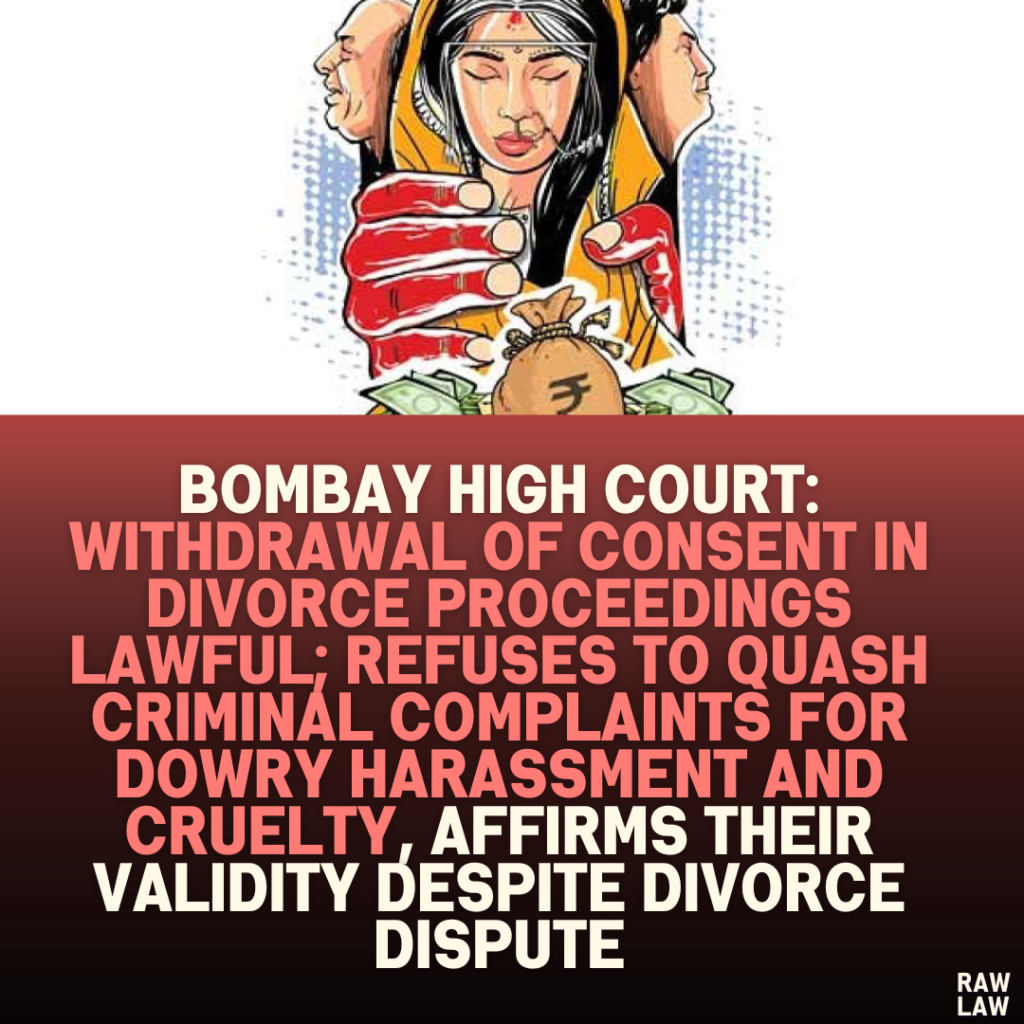Court’s Decision
The Bombay High Court rejected the petitioner’s plea to quash criminal proceedings under Sections 498-A and 406 of the Indian Penal Code (IPC), holding that the respondent’s withdrawal of consent under Section 13B(2) of the Hindu Marriage Act, 1955 (HMA), was a lawful exercise of her statutory rights. The court stated that this withdrawal does not amount to abuse of process and does not justify quashing the FIR alleging cruelty and misappropriation of assets.
Facts of the Case
- The petitioner and respondent were married in 2015 but faced matrimonial disputes.
- The petitioner filed for mutual consent divorce under Section 13B of the HMA, and both parties signed a settlement agreement outlining various terms, including the transfer of a flat to the respondent.
- The respondent withdrew consent for the second motion under Section 13B(2), citing coercion and non-fulfillment of settlement terms by the petitioner.
- Separately, the respondent filed an FIR in Mumbai alleging cruelty, harassment, and dowry demands by the petitioner and his family.
- The petitioner sought to quash the FIR, arguing that the respondent’s withdrawal of consent violated the settlement agreement and was an abuse of legal process.
Issues
- Does the respondent’s withdrawal of consent under Section 13B(2) of the HMA constitute an abuse of process?
- Should the criminal proceedings initiated by the respondent based on the FIR be quashed?
Petitioner’s Arguments
- Violation of Settlement Agreement: The respondent’s withdrawal of consent was in breach of the terms agreed upon in the settlement agreement.
- Abuse of Process: The continuation of criminal proceedings was alleged to be a vindictive act by the respondent and an abuse of the legal system.
- Legal Precedents: The petitioner relied on Supreme Court decisions to argue that non-compliance with settlement terms and withdrawal of consent amounted to misconduct justifying quashing of the FIR.
Respondent’s Arguments
- Statutory Right to Withdraw: The respondent asserted her right to withdraw consent under Section 13B(2) of the HMA, which allows a party to reconsider the decision to divorce before the decree is finalized.
- Non-Fulfillment of Settlement Terms: The petitioner had not fulfilled key obligations, including transferring the flat and paying society maintenance charges.
- Substantial Allegations in FIR: The FIR detailed instances of physical and mental cruelty, dowry harassment, and misappropriation of assets by the petitioner and his family, warranting a proper trial.
Analysis of the Law
- Section 13B of the HMA:
- Section 13B(1) allows couples to file for mutual consent divorce, subject to certain conditions.
- Section 13B(2) provides for a six- to eighteen-month cooling-off period, during which either party can withdraw consent, reflecting the law’s intent to allow parties to reconsider their decision.
- Cooling-Off Period: The court noted that the cooling-off period ensures autonomy and prevents hasty or coerced decisions in divorce proceedings. The right to withdraw consent is absolute and unqualified under the statute.
- Jurisdictional Limitations: The court emphasized that withdrawal of consent leaves the court without jurisdiction to pass a decree for mutual consent divorce.
- Criminal Proceedings and FIR: The court observed that allegations in the FIR, including dowry harassment and cruelty, prima facie disclosed cognizable offenses that merited trial. It reiterated that the High Court cannot conduct a mini-trial to evaluate the veracity of these claims at the stage of quashing the FIR.
Precedent Analysis
- Sureshta Devi v. Om Prakash: The Supreme Court clarified that mutual consent must subsist until the final decree under Section 13B(2). Withdrawal of consent by either party renders the court powerless to grant divorce by mutual consent.
- Smruti Pahariya v. Sanjay Pahariya: The Supreme Court held that mutual consent is a jurisdictional requirement for divorce under Section 13B. The absence of such consent at any stage prior to the decree bars the court from granting divorce.
- Anil Kumar Jain v. Maya Jain: The Supreme Court highlighted that mutual consent must continue throughout the proceedings, and the court cannot compel a party to proceed with divorce.
- Hitesh Bhatnagar v. Deepa Bhatnagar: It was held that withdrawal of consent is permissible at any time before the decree is passed, and the court must ensure that consent is freely given.
Court’s Reasoning
- Right to Withdraw Consent: The court affirmed that Section 13B(2) explicitly allows either party to withdraw consent at any stage before the decree. This right cannot be negated by any settlement or agreement.
- Non-Fulfillment of Settlement Terms: The petitioner’s failure to transfer the flat to the respondent, as agreed in the settlement, undermined his claims.
- Legitimacy of Criminal Proceedings: The FIR detailed specific allegations of cruelty and dowry harassment, supported by witness statements. The court ruled that these allegations warranted proper investigation and trial.
- No Abuse of Process: The respondent’s decision to withdraw consent and pursue criminal proceedings was consistent with her legal rights and did not constitute an abuse of process.
Conclusion
The court dismissed the petition, holding that the respondent’s withdrawal of consent under Section 13B(2) was lawful and her allegations in the FIR disclosed cognizable offenses. The court vacated the interim stay, allowing the criminal proceedings to continue.
Implications
- Statutory Protections: The judgment reinforces the right of individuals to withdraw consent under matrimonial law, safeguarding autonomy and preventing coercion.
- Balancing Civil and Criminal Proceedings: It establishes that the withdrawal of consent in divorce proceedings does not nullify the validity of criminal complaints based on independent allegations.
- Enforcement of Settlement Terms: The judgment underscores the importance of fulfilling settlement obligations to avoid legal complications and disputes.




Pingback: Chhattisgarh High Court Dismisses Appeal: "Section 19 Permits Appeals Only Against Punishment Orders; Contempt Court Exceeded Jurisdiction by Adjudicating the Dispute - Raw Law